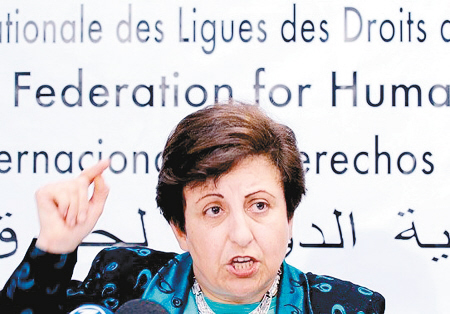Shirin Ebadi, born in 1947, is an Iranian lawyer and human rights activist. She is most famous for winning the 2003 Nobel Peace Prize. The panel of judges praised her significant and pioneering efforts for democracy and human rights, especially women's and children's rights. She is the only Iranian and the first Muslim woman to receive the prize.
希爾琳·艾芭迪出生于1947年,她是伊朗律師和人權活動者。最為人們所知的是在2003年獲得諾貝爾和平獎。評委會贊賞她對民主和人權所做出的卓越貢獻,特別是兒童和婦女的權益。并成為第一位獲得該獎的伊朗人和穆斯林女性。
Ebadi grew up in Teheran and graduated in law in 1965. Four years later, she qualified to become a judge. In 1975, she became the first woman in her country to be in charge of a court. Following the Iranian Revolution in 1979, the new government decided it was against Islam for women to be judges, so Ebadi was demoted to a secretarial position.
艾芭迪出生在德黑蘭,1965年,艾芭迪法學畢業。四年之后,她成為了一名法官。1975年,她成為了伊朗首位女性大法官。1979年,伊朗發生革命,新政府認為女性法官違反了伊斯蘭教義,艾芭迪被降職成了一名秘書。

Ebadi was allowed to practice as a lawyer in 1993. She famously defended high-profile cases, especially those who challenged Iran’s leadership. She started campaigning for greater legal protection for women and children, gender equality, and democracy. She drafted a text against the physical abuse of children, which passed into law in 2002. She also founded the Children's Rights Support Association in Iran.
1993年,艾芭迪被允許獲得了律師資格。她參與了許多備受關注的案件,特別是一些威脅伊朗領導層的案件。她開始為婦女、兒童、男女平等以及民主尋求法律保護。她起草了反對虐待兒童的法律條文,并于2002年立法。她還建立了伊朗的兒童權益保障協會。
Winning the Nobel Prize propelled Ebadi onto the world stage. The selection committee praised her as a "courageous person" who "has never heeded the threat to her own safety". In 2008 she spoke about the dangers she faces in pursuing human rights. "Threats against my life and security and those of my family, which began some time ago, have intensified,"she said.
諾貝爾獎讓艾芭迪登上了世界舞臺。評選委員會贊揚了她的無畏精神,在自身安全受到威脅時,她從未低頭。2008年,她講述了在追尋人權道路中所遇到的危險。她稱:“曾經威脅我生命、安全以及家人的事件愈演愈烈。”
譯文屬可可英語原創,未經允許,不得轉載。











